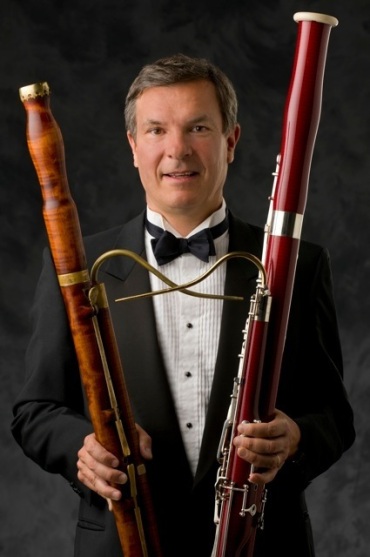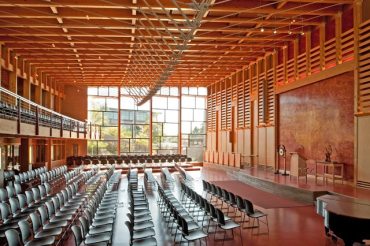The Well-Tempered Ear
Classical music: The Madison Bach Musicians perform Bach’s “St. John Passion” this Friday night and Saturday night in authentic early music style
Leave a Comment
By Jacob Stockinger
The Madison Bach Musicians (below), which specializes in authentic period performances of early music, will perform Johann Sebastian Bach’s “St. John Passion” this coming Friday and Saturday nights, both at 7:30 p.m., in the Atrium Auditorium of the First Unitarian Society of Madison, 900 University Bay Drive.
On both nights at 6:45 p.m., MBM founder and music director Trevor Stephenson (below) will give a free pre-concert lecture on the “Structure and Performance History of the St. John Passion.” In his remarks, Stephenson said he will discuss the question of anti-Semitism in the famous work.
(NOTE: Stephenson and some of the players will also be on Wisconsin Public Radio’s “The Midday” with Norman Gilliland TODAY at noon.)
At the end of Part I, the Rev. Michael Schuler of the Unitarian Society will give a talk focusing on “Theological Reflections on Bach and the St. John Passion.”
This is only the second time the work has been performed in historical style in the state of Wisconsin. For more information and explanation, see the story in the Wisconsin State Journal:
Tickets are $28-$33 and are available online, at Orange Tree Imports and at the door. Ticket information is at www.madisonbachmusicians.org
Trevor Stephenson writes the following about the work and the performance:
Bach was 38 years old when he composed the monumental St. John Passion during his initial year of employment in Leipzig, 1723-24. The work was first performed at the Nikolai Church during the Good Friday service on April 7, 1724.
As was the custom, no concerted music had been played in church during the previous six weeks of Lent, and the airing of the St. John Passion ― music of unprecedented complexity, lasting for over two hours — must have had an overwhelming effect on the fresh ears and devoted souls of the parishioners.
From its outset—with the whirling gear-like figures in the strings beneath the moiling of the oboes—the St. John Passion has an otherworldly aura of a story that has been foretold. Bach’s genius is in how he balances this inevitability with a sense of forward dramatic thrust: the passion story must happen, has already happened, but it also must be played out in real-time by living people, step by painful step. Time is at once both linear and circular. (Below is the manuscript for the “St. John Passion.”)
I believe that the objective of Bach (below) in setting the St. John Passion was to tell as vividly as possible the story of Jesus’ cruel earthly demise while at the same time tempering this vividness with frequent textual reminders, as well as an overarching tone, that convey the firm belief that Jesus’ Passion had not only been prophesied long before his birth but that Jesus’ suffering and death on earth was the only solution for the forgiveness of humanity’s sins.
The Evangelist John is our guide for the story of Jesus’ arrest, trial, crucifixion and burial. John sings his narration in the dry and angular recitative style, addressing the audience directly. He summarizes some scenes and introduces others, which are then played out in present-tense tableau format by various characters: Jesus, Peter, Pilate, Court officers, the angry mob.
Bach uses two techniques to pause and comment upon the narrative: first, with arias for solo voices and instrumental obbligato, that employ freely-composed poetry to reflect upon the story in a personal way — like the thoughts of someone observing the action; and second, by chorales which use tunes and texts that would have been familiar to Bach’s parishioners to elicit a broader communal response to the passion story. Many of the chorales are like a spiritual balm, providing moments of much needed rest throughout the work.
For the upcoming April 14 and 15 concerts of the St. John Passion ― on Good Friday and Holy Saturday ― the Madison Bach Musicians has endeavored as much as possible to recreate the early 18th-century sound world of that first Leipzig performance in 1724. MBM will use a 17-member baroque orchestra, conducted by UW-Madison bassoonist and performance-practice specialist Marc Vallon (below, in a photo by James Gill).
The orchestra will play entirely on 18th-century style instruments:
- Gut-strung violins, violas, cellos, and bass played with baroque bows which facilitate articulation and phrase grouping
- Early 18th-century single-keyed wooden traverso flutes and single-keyed wooden oboes―uniquely warm-sounding and clear-toned. Plus the baroque ancestor of the modern English horn, the tenor oboe da caccia
- A baroque chamber organ with wooden pipes tuned in 18th-century Well Temperament
- And specialty instruments—even by 18th-century standards. The viola da gamba, featured during the tombeau– or tomb-like Es ist vollbracht (It is fulfilled) aria heard after Jesus’ death; and two violas d’amore, delicate and velvet toned, replete with sympathetic strings for a haunting after-glow of sound. (You can hear that aria in the YouTube video at the bottom.)
These instruments will join with 10 outstanding vocalists—specialists in singing both solo and choral baroque repertoire.
Internationally recognized, and Grammy Award winning tenor, Dann Coakwell (below, in a photo by Mary Gordon) will sing the part of John the Evangelist.
The Passion will be sung in its original German; but an English translation of the text will be projected in supertitles scene-by-scene throughout the performance.
MBM is thrilled to be presenting this masterwork in the Atrium Auditorium (below, in a photo by Zane Williams) at First Unitarian Society, a space beautifully suited to early music. The sightlines are superb, and the acoustics offer a great balance of clarity, crispness, and spaciousness.
Seating is limited, so advance ticket purchase is suggested.
Tags: 18th century, acoustics, anger, anti-Semitism, aria, arrest, Arts, Bach, Baroque, Bassoon, burial, Cello, choral music, Chorale, Christian, Classical music, communal, conductor, court, crucifixion, death, Early music, Earth, English, English horn, evangelist, flute, forgiveness, German, Germany, Good Friday, Grammy Award, historically informed performance practices, History, Holy Saturday, Horn, instrumental, Jacob Stockinger, Jesus, Johann Sebastian Bach, Leipzig, Lent, Madison, manuscript, Marc Vallon, Michael Schuler, mob, Music, noon, Norman Gilliland, Oboe, Orchestra, organ, Passion, performance, period instruments, period performance, Peter, Pilate, Poetry, sightline, sing, singer, solo, Sound, spiritual, St. John, St. John Passion, strings, structure, suffering, supertitles, tenor, text, The Midday, theology, time, translation, trial, tune, United States, University of Wisconsin-Madison School of Music, University of Wisconsin–Madison, Viola, viola d'amore, viola da gamba, Violin, vocal music, voice, Wisconsin, wisconsin public radio, Wisconsin State Journal, wood, YouTube
- May 2024
- April 2024
- March 2024
- February 2024
- January 2024
- December 2023
- November 2023
- October 2023
- September 2023
- August 2023
- July 2023
- June 2023
- May 2023
- April 2023
- March 2023
- February 2023
- January 2023
- December 2022
- October 2022
- September 2022
- June 2022
- May 2022
- April 2022
- March 2022
- July 2021
- June 2021
- May 2021
- April 2021
- March 2021
- February 2021
- January 2021
- December 2020
- November 2020
- October 2020
- September 2020
- August 2020
- July 2020
- June 2020
- May 2020
- April 2020
- March 2020
- February 2020
- January 2020
- December 2019
- November 2019
- October 2019
- September 2019
- August 2019
- July 2019
- June 2019
- May 2019
- April 2019
- March 2019
- February 2019
- January 2019
- December 2018
- November 2018
- October 2018
- September 2018
- August 2018
- July 2018
- June 2018
- May 2018
- April 2018
- March 2018
- February 2018
- January 2018
- December 2017
- November 2017
- October 2017
- September 2017
- August 2017
- July 2017
- June 2017
- May 2017
- April 2017
- March 2017
- February 2017
- January 2017
- December 2016
- November 2016
- October 2016
- September 2016
- August 2016
- July 2016
- June 2016
- May 2016
- April 2016
- March 2016
- February 2016
- January 2016
- December 2015
- November 2015
- October 2015
- September 2015
- August 2015
- July 2015
- June 2015
- May 2015
- April 2015
- March 2015
- February 2015
- January 2015
- December 2014
- November 2014
- October 2014
- September 2014
- August 2014
- July 2014
- June 2014
- May 2014
- April 2014
- March 2014
- February 2014
- January 2014
- December 2013
- November 2013
- October 2013
- September 2013
- August 2013
- July 2013
- June 2013
- May 2013
- April 2013
- March 2013
- February 2013
- January 2013
- December 2012
- November 2012
- October 2012
- September 2012
- August 2012
- July 2012
- June 2012
- May 2012
- April 2012
- March 2012
- February 2012
- January 2012
- December 2011
- November 2011
- October 2011
- September 2011
- August 2011
- July 2011
- June 2011
- May 2011
- April 2011
- March 2011
- February 2011
- January 2011
- December 2010
- November 2010
- October 2010
- September 2010
- August 2010
- July 2010
- June 2010
- May 2010
- April 2010
- March 2010
- February 2010
- January 2010
- December 2009
- November 2009
- October 2009
- September 2009
- August 2009
Archives
- 2,491,505 hits
Blog Stats
Recent Comments
| Brian Jefferies on Classical music: A major reass… | |
| welltemperedear on What made Beethoven sick and… | |
| rlhess5d5b7e5dff on What made Beethoven sick and… | |
| welltemperedear on Beethoven’s Ninth turns 200… | |
| Robert Graebner on Beethoven’s Ninth turns 200… |
Tags
#BlogPost #BlogPosting #ChamberMusic #FacebookPost #FacebookPosting #MeadWitterSchoolofMusic #TheEar #UniversityofWisconsin-Madison #YouTubevideo Arts audience Bach Baroque Beethoven blog Cello Chamber music choral music Classical music Compact Disc composer Concert concerto conductor Early music Facebook forward Franz Schubert George Frideric Handel Jacob Stockinger Johannes Brahms Johann Sebastian Bach John DeMain like link Ludwig van Beethoven Madison Madison Opera Madison Symphony Orchestra Mead Witter School of Music Mozart Music New Music New York City NPR opera Orchestra Overture Center performer Pianist Piano post posting program share singer Sonata song soprano String quartet Student symphony tag The Ear United States University of Wisconsin-Madison School of Music University of Wisconsin–Madison Viola Violin vocal music Wisconsin Wisconsin Chamber Orchestra wisconsin public radio Wolfgang Amadeus Mozart YouTube





